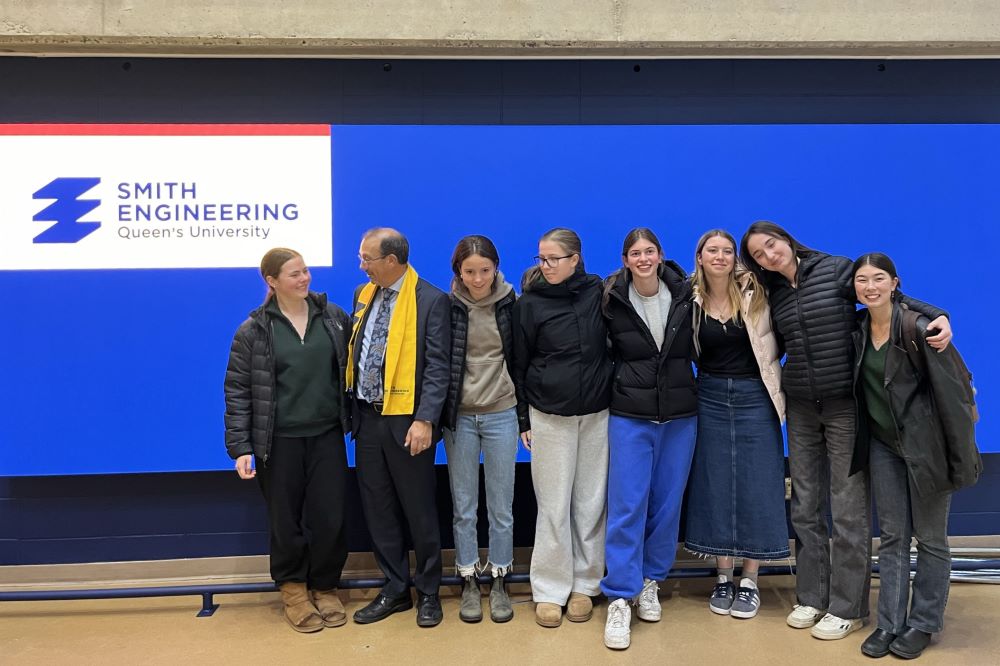
The Faculty of Engineering has received a $100M gift from entrepreneur, philanthropist, and engineering alumnus Stephen J.R. Smith, BSc’72. With the goal of transforming engineering education, this is an investment in the engineering faculty’s ability to empower future generations of engineers to respond to the world’s increasingly complex challenges.
This is the largest gift made to an engineering faculty in Canada, one of the largest to any university in Canada, and one of the largest ever to Queen’s. In recognition of Smith’s extraordinary generosity, Queen’s University has announced a new name for the faculty: the Stephen J. R. Smith Faculty of Engineering and Applied Science.
“Stephen Smith’s transformational gift will benefit faculty and students for generations to come,” says Patrick Deane, Principal and Vice-Chancellor at Queen’s University. “The significance of this investment and the renaming of the faculty signal the beginning of a new era, one that builds on a foundation of 130 years of excellence.”
A new era of engineering education
The challenges and opportunities facing humanity are complex, multidisciplinary, and global. They require a deep understanding of both technology and society. Smith Engineering at Queen’s aims to equip the next generations of engineers with the knowledge, skills, and mindset to drive positive change here and around the world.
Smith’s gift puts Queen’s and Smith Engineering on track not only to meet these goals early but expand past them into a global leadership position.
“The majority of this $100 million gift will be endowed, to provide an enduring legacy of talent and resources from around the world for generations to come. The balance will facilitate the development and implementation of groundbreaking programs, as well as investments in research, technology, and equipment,” says Kevin Deluzio, Dean of Smith Engineering. “It is about changing how we teach our students so, in turn, as graduates they can change the world we live in and help solve the numerous complex problems facing humanity.”
Interdisciplinary empowerment at scale
To truly excel in redefining engineering education, this endeavour must envision humanity’s needs in 10, 20, or even 50 years, and build toward those realities. It is not an incremental undertaking that has the luxury of accruing momentum over decades. Scalability is essential: this ambition must operate across thousands of students.
“This cannot be done through engineering alone,” says Keith Pilkey, head of the Faculty’s Mechanical and Materials Engineering department. “Students must combine their knowledge with perspectives from other disciplines to create balanced approaches that are thoughtful, equitable, and sustainable. They must have greater access to experiential learning opportunities that promote collaboration with different fields of study, local communities, and industry partners. All in service of reflecting the very real and complex environment that awaits after graduation. In other words, the curriculum must incorporate meaningful projects that explicitly develop the skills required for solving real-world problems.”
These requirements underscore the importance of Smith’s gift, both in its size and timing. He recognizes that engineering can be a leading force in creating global impact.
“The education I received as a student at Queen’s was foundational to the success I’ve achieved in my professional and personal life,” says Mr. Smith. “I have long admired Queen’s commitment to STEM education and research, and I am proud to contribute as it transforms engineering education to prepare graduates to address the greatest challenges of our times.”
Over time, this new approach to engineering education will develop generations of leaders who think critically at every turn and apply a human-centred approach to problem-solving and creative design.
Prioritizing inclusivity: engineering for everyone
Positive impact on the global stage requires a global perspective, and solutions for a diverse society come from diverse teams. Humanity is an interdependent tapestry of voices, lived experiences, cultures and creeds, and engineering programs across the world are working to break down barriers to inclusivity and diversity.
Smith Engineering will build on the momentum in our field, recognizing that inclusivity is a moral obligation as well as a catalyst for innovation and uncovering novel paths to progress.
These transformational changes to engineering programs and educational models will attract students from a broader set of backgrounds and with more diverse perspectives. The strategic faculty recruitment and support expand students’ access to a wider range of pedagogy.
And, critically, the gift enables Queen’s to prioritize and grow experiential learning opportunities that embed engineers into the community. Hands-on experience that reflects the true needs of our world, from local to international projects, eclipses any classroom’s ability to instill the importance of inclusivity and diversity.
A legacy of leadership
“Increasingly, students are determined to change the world,” says Dean Deluzio. “As educators, we must encourage and nurture this drive by teaching them sooner and more deliberately about the impact engineering can have. Rather than wait for graduation, we must give students the opportunity to have that impact in the earliest stages of their education.”
Smith’s $100M gift will underpin decades of rapid growth for impact-focused education at Queen’s, and in Canada. The new model of education promises to be technically rigorous, experientially focused, socially conscious, and creatively inspired.
Smith Engineering graduates will have the knowledge and tools to not only create our technology and processes; they will also guide the evolution, and how it integrates with an ever-changing world.
More details about Smith’s gift and its deployment will follow in the coming weeks.